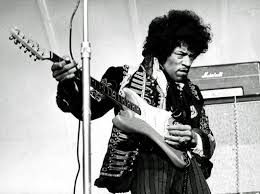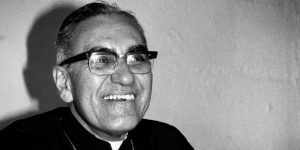Jimi Hendrix stands before over 200,000 people about to make musical history. It’s 1969, in the middle of the war in Vietnam. The Vietnam War was one of the bloodiest in this nation’s history, people who went to Vietnam often returned in a damaged state, if they returned at all.1 At the time, the presidential approval rating in the war was only around 39 percent, and Jimi Hendrix prepared to demonstrate his opinion of the war with his rendition of the National Anthem.2

Before Hendrix was a famous musician, he was in the military. He was honorably discharged due to an ankle injury. He had signed up for one year, however, while on duty, he couldn’t hold intelligent conversations, fell asleep, and was more focused on his guitar than his work. After he was discharged, he shifted his focus completely to his guitar. Soon after, his music career took off and he released “Hey Joe” with his band The Jimi Hendrix Experience. He quickly rose to fame, and soon after he was headlining his own tours and selling out massive shows. 3
Rain delays caused Hendrix to play on Monday at Woodstock that year. While he was offered an opportunity to perform at midnight, he chose to play the next morning. Even though Hendrix passed on the opportunity to play in front of the massive crowds that were still there at midnight, he still played for dedicated fans. However, he didn’t come for the fans, he came for the experience. Hendrix’s performance was shaped by the the current state of the Vietnam War, which was at its peak when he played. Hendrix’s music was also shaped by his complete unwillingness to conform, he refused to be a part of normal society, and he refused to support the war.4 Over 58,200 American soldiers died in the Vietnam War, and many of the people in the United States didn’t know why the nation was fighting, and many just wanted peace. This political context fueled Hendrix’s passion-filled performance which lasted over two hours, and included an encore. Encores were rare for Hendrix, and so concert-goers were ecstatic.

The performance included a medley of some of his songs, and in the middle of this is when he made musical history. Jimi Hendrix played a solo version of the National Anthem. His rendition included many parts of the song where he misplayed the song on purpose. He dragged out the notes for “the bombs bursting in air,” showing that the Star Spangled Banner talks about America’s history involving many wars. He also misplayed the notes for “home of the brave,” drawing to question why we call the men fighting a war with very little acceptance in our country heroes. Because he was in the military, he knew how the system worked, and he didn’t like it. He also added in parallels and similarities to the song “taps,” to show the amount of death the country had seen, as if to ask “is it worth it”? He purposely dropped the notes and let them come out unclean and muffled. He wanted to display that even something as patriotic as the National Anthem glorified our nation’s destructive ways of solving international issues. He did this by accenting the notes where this was prevalent and bringing attention to them. The audience had mixed reactions however. While many of them saw the passion-filled protest he was trying to portray, some of the fans were appalled by how he played the national anthem. People wrote to media networks saying that what he did was a disgrace. His performance was a polarizing force, he was able to both unite people behind him and the war protests, as well as causing people to speak up against the desecration of our National Anthem.5
Hendrix made music history because he had so many fans, and he was able to actively voice his opinion without using words. Whether you agree with his protests or not, he was very successful at gathering a crowd and influencing their thoughts.6

- “PART IV: TO LIFE: War = Killing,” AirWAVES (May 1999): 235–36. ↵
- W. Dennis, “Ritual Behavior and Consumer Symbolism,” ACR Special Volumes, (January 01, 1984): 279-284 ↵
- Andy Bennet, “Remembering Woodstock,” Taylor & Francis Group, (September 29, 2017): 1-4 ↵
- Wendy Smith, “Rock of Ages: Forty Years after Their Deaths, Jimi Hendrix and Janis Joplin; Now Seem Part of the Mainstream Culture They Rebelled Against.” American Scholar, 79 no. 4(2010): 89–92. ↵
- Clague, Mark. “‘This Is America’: Jimi Hendrix’s Star Spangled Banner Journey as Psychedelic Citizenship.” Journal of the Society for American Music 8 4(2014): 435–78. ↵
- Anne-Marie Morrissey, “Beyond the Image: The Giftedness of Jimi Hendrix,” Roeper Review 24 no. 1( 2001): 5. ↵



56 comments
Eric Ortega Rodriguez
I have never heard of Jimmy Hendrix singing the National Anthem this way. However, it makes sense that he would voice his opinion during his concert especially since he knew what occurred within the military, I admire Jimmy Hendrix for having the courage to state his stance on such a controversial topic at the time. Though we can all agree that at the end, either victory or defeat, we are all losing when thousands of lives are lost in combat.
Mariah Garcia
With all honesty, I didn’t know who Jimi Hendrix was until I read this article. I had heard of his name but never knew how outspoken and expressive he was. He used his talent in music to draw his passion for being against the war and made sure why especially during the National Anthem. He had experience the war first-hand and knowing what happens made it credible. He didn’t waste his talent on the sole purpose to bring fame but to express his views and many others.
Donte Joseph
Before reading this article I truthfully had no knowledge on Jimmy Hendrix, only that he was a musician. After reading, I had learned way more than I had anticipated. For starters, I did not know that he served before music and had gotten honorable discharge due to an ankle injury. Another thing that I learned was how big of an influence he was on others and how he was able to get his message across through his music.
Daniela Martinez
Jimi Hendrix is one of my all-time favorite musicians. I was aware that Hendrix was in the military and that he left. Hendrix was one of the few musicians at the time that was not afraid to express himself and voice his opinions through his music. While he did not support the war, he was still able to get honorably discharged. Hendrix was able to become a role model for many and thus was able to gather many crowds and influence them.
Valeria Perez
Reading the manner in which Jimmy Hendrix sand the National Anthem and how people reacted to it reminds me a lot of the current parallel we are having with people kneeling during the anthem at sports events. It is interesting to see how somethings as patriotic as the anthem can be such a powerful tool for protests both in the past and in the present. I enjoy hearing stories such as this one where people use the power of music for something more than just to bring fame to the artist, they use it to express their views.
Alexandria Zapata
Jimi Hendrix was a music icon for expressing his own voice, and for his amazing contribution to the music industry. I didn’t know Jimi was in the military, but got honorably discharged. He was dedicated to the experience, He didn’t support the war, and thats where Jimi drew his passion from. Jimi voiced his opinion without using so many words, and he brought out people and their thoughts.
Jose Fernandez
I liked the article very much. I’m not a fan of Jimi Hendrix, but I know he is a legend who deserves a lot of recognition. It’s impressive how one person can make a difference in the minds of thousands. Hendrix’s performance of the National Anthem during the Vietnam war demonstrated not only his creativity as an artist, but his courage as a patriot.
Hailey Stewart
This article explains such a clever protest. I never knew that protest’s could be so subtle. Although this article is short, it maintains its focus and keeps the reader’s attention. I think it is so great that American artists have had such freedom to criticize the country they live in, in effort to bring attention to and change things for the better.
Sabrina Hsu
I never knew Jimi Hendrix did this, and it was really bold of him to do. He did it knowing that it could cause him to lose many of his fans and make many people dislike him, but he did it anyway because he wanted to show people his opinion of the war. He definitely did not fail in what he was trying to do. Even though some people were outraged with what he did, others followed in his footsteps and spoke out about the war, participated in protests, and showed what they believed in. He was an inspiration for people and I don’t think there is another wrong with that.
Maisie Favila
Jimi Hendrix is such a huge rock icon, and one of my favorite musicians. I found it interesting after his service, he pursued his music career. It’s obvious that Hendrix put so much emotion into his performances and this article stated that clearly. His protest was similar to many going on in America today. Although many saw this as very problematic, he will always be known as one of the faces in rock n’ roll history. This article was well written and very informative, I enjoyed it.